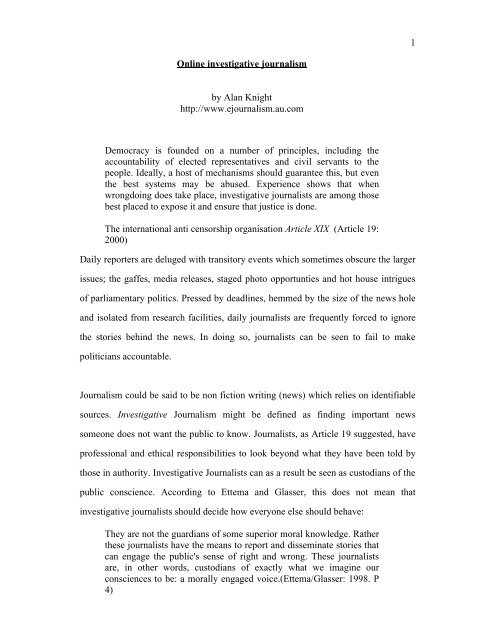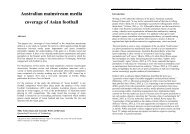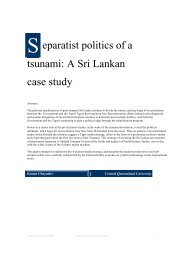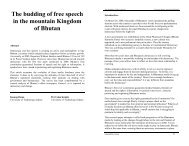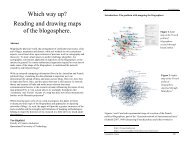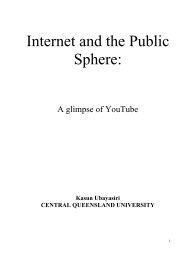1 Online investigative journalism by Alan Knight http ... - eJournalist
1 Online investigative journalism by Alan Knight http ... - eJournalist
1 Online investigative journalism by Alan Knight http ... - eJournalist
You also want an ePaper? Increase the reach of your titles
YUMPU automatically turns print PDFs into web optimized ePapers that Google loves.
1<br />
<strong>Online</strong> <strong>investigative</strong> <strong>journalism</strong><br />
<strong>by</strong> <strong>Alan</strong> <strong>Knight</strong><br />
<strong>http</strong>://www.e<strong>journalism</strong>.au.com<br />
Democracy is founded on a number of principles, including the<br />
accountability of elected representatives and civil servants to the<br />
people. Ideally, a host of mechanisms should guarantee this, but even<br />
the best systems may be abused. Experience shows that when<br />
wrongdoing does take place, <strong>investigative</strong> journalists are among those<br />
best placed to expose it and ensure that justice is done.<br />
The international anti censorship organisation Article XIX (Article 19:<br />
2000)<br />
Daily reporters are deluged with transitory events which sometimes obscure the larger<br />
issues; the gaffes, media releases, staged photo opportunties and hot house intrigues<br />
of parliamentary politics. Pressed <strong>by</strong> deadlines, hemmed <strong>by</strong> the size of the news hole<br />
and isolated from research facilities, daily journalists are frequently forced to ignore<br />
the stories behind the news. In doing so, journalists can be seen to fail to make<br />
politicians accountable.<br />
Journalism could be said to be non fiction writing (news) which relies on identifiable<br />
sources. Investigative Journalism might be defined as finding important news<br />
someone does not want the public to know. Journalists, as Article 19 suggested, have<br />
professional and ethical responsibilities to look beyond what they have been told <strong>by</strong><br />
those in authority. Investigative Journalists can as a result be seen as custodians of the<br />
public conscience. According to Ettema and Glasser, this does not mean that<br />
<strong>investigative</strong> journalists should decide how everyone else should behave:<br />
They are not the guardians of some superior moral knowledge. Rather<br />
these journalists have the means to report and disseminate stories that<br />
can engage the public's sense of right and wrong. These journalists<br />
are, in other words, custodians of exactly what we imagine our<br />
consciences to be: a morally engaged voice.(Ettema/Glasser: 1998. P<br />
4)
2<br />
Investigative <strong>journalism</strong> combines basic <strong>journalism</strong> reporting skills with more<br />
advanced research methods. Original research was seen as the distinguishing feature<br />
of <strong>investigative</strong> reporting:<br />
It is not a summary or piecing together of others' findings and data,<br />
but original research carried out <strong>by</strong> reporters using often the rawest of<br />
material. It can be extensive interviewing, or matching and comparing<br />
facts and figures. In many cases, the fruits, and originality, come in<br />
discovering patterns and connections in the information that no one<br />
has observed before. (Randall: 1996. pp78/79)<br />
Randall wrote that <strong>investigative</strong> reports often resulted from a "suspicion of<br />
wrongdoing". An <strong>investigative</strong> reporter would be required to engage in a prolonged<br />
inquiry, compiling a research dossier, from which a story or stories might be written.<br />
Such inquiries would require reporters and editors to manage time and resources, so<br />
that results might be maximised, he said.<br />
Investigative reporting on the net<br />
Interviews, documents, surveillance and surveys are the tools of the<br />
<strong>investigative</strong> reporter. The reporter learns which to use at a certain<br />
time, like a golfer who knows which club to use under different<br />
conditions as he or she progresses through a course. The best<br />
investigators during the course of their investigation may draw on all<br />
of the tools at one time or another. (Gaines : 1998. p17)<br />
The Internet offers <strong>investigative</strong> journalists new tools for reporting; qualified access<br />
to global communities of interests which may provide alternate sources to those in<br />
authority. In doing so, it presents opportunities and problems for <strong>investigative</strong><br />
reporters. Meanwhile, it impacts on production processes with radio, television and<br />
text <strong>journalism</strong> practices converging through digitisation on the internet; towards a<br />
new hybrid profession, e<strong>journalism</strong>. With faster computers, newer compressed<br />
programs and wider band widths, internet publications will rapidly offer more<br />
sophisticated, interactive variants of the older media.
3<br />
Such <strong>investigative</strong> reporting need not be expensive or beyond the reach or ordinary<br />
journalists. But it does require greater commitment than daily <strong>journalism</strong>. Daily news<br />
reporting can be relatively quick, clean and have clear objectives. Investigative<br />
journalists must transmit complex information to a very wide public; applying<br />
illustrations, audio grabs, computer generated graphics, and library footage<br />
appropriate to their selected medium.<br />
The Internet has become a new source for <strong>investigative</strong> reporters. It allows non linear<br />
alternatives in <strong>journalism</strong> style. It offers opportunities for independent publishing.<br />
But in doing so it eclipses earlier notions that journalists can be defined as merely<br />
those employed <strong>by</strong> mainstream mass media.<br />
E<strong>journalism</strong>: Communications<br />
In 1870, the famous London Times correspondent, William Russell found his essays<br />
on the Franco Prussian war scooped <strong>by</strong> less well known competitors who cabled the<br />
news back home:<br />
In the past, only news 'flashes' had been transmitted <strong>by</strong> wire. Now an<br />
army of pushing, vulgar, uncouth and alarmingly effective American<br />
correspondents had taken the field, who regarded the mails as a tool<br />
of the stone age, and relied almost exclusively upon the telegraph to<br />
file their despatches. (Hastings: 1995. xxiv)<br />
Internet delivered Email, voice and video links allow contemporary reporters to<br />
maintain global links with their editors and participate in editorial conferences where<br />
stories are discussed. Text, vision and audio items are created in digitised files which<br />
may be easily transmitted to base <strong>by</strong> telephone, satellite link or radio broadcast. The<br />
huge and cumbrous portable live broadcast facilities used <strong>by</strong> CNN to cover the Gulf<br />
war are already being replaced <strong>by</strong> laptops, modems and satellite phones. During the<br />
Hong Kong handover in 1997, photographers were filing from the China border even<br />
as the People's army rolled in:
4<br />
There was a Swedish guy who had a very tight deadline who was<br />
using a sat [satellite] phone to send his material directly back [to<br />
Sweden]. He plugged his digital camera into his laptop, added the<br />
captions and then dialled his newspaper direct. (Tatlow:1997)<br />
E<strong>journalism</strong> : Production<br />
Modern news writing devolved from a clipped pyramidal style developed for<br />
economic transmission of stories from remote locations via the telegraph. That style<br />
influenced the choice journalists made when they constructed stories; eg. The quote<br />
sought in interviews, the illustrations selected and the headlines. These usually<br />
unstated production requirements became a learned part of a pervasive newsroom<br />
culture.<br />
Journalists have been quick to adopt new communications technology but may be<br />
slower to abandon old practices. Early radio news reports consisted of an announcer<br />
reading newspaper stories on air. Early television bulletins seemed to be little more<br />
than radio with pictures. New styles evolved to meet the potentials of the newer<br />
media. Agence France Press Webmaster, David Sharp said the internet was already<br />
affecting the way AFP journalists wrote their stories:<br />
The worldwide web creates the possibility for hyper linking therefore<br />
there is a possibility to create much richer story structures which in<br />
itself can also create problems because it's very easy to build<br />
structures which are too complicated for people to follow. But for<br />
general reading of stories there is definitely a trend towards brevity<br />
because it's well known for example that the average person reading<br />
text from a screen will read about 25% slower than the same person<br />
reading the same information from a printed page. People generally<br />
do not want to scroll so there's another reason for brevity. There tends<br />
to be a trend towards using more subtitles as in bulleted lists, getting<br />
use to the idea that on the Internet people can and do begin reading a<br />
story at any point. Therefore you need to structure stories in such a<br />
way that different parts of it are comprehensible in themselves. So I<br />
think it is changing the way people write. 1<br />
1<br />
Sharp, David. Personal Interview. Sydney. November 1999.
5<br />
E<strong>journalism</strong> transcends and incorporates the one dimensional stories of earlier media.<br />
Stories on the Internet will be multi-faceted and the journalists who produce them will<br />
need to be multiskilled: able to create logical and clear textual accounts, link<br />
information, gather audios and take videos and photo images. They will be able to<br />
incorporate them all on a single or series of websites. Linear concepts of news can as<br />
a result be expected to transform into multi layered reports reflecting the wider choice<br />
of informations.<br />
E<strong>journalism</strong> : Distribution:<br />
The Internet allows the polished digitised product to be published globally; wherever<br />
computers are linked to the telecommunications grid. Deadlines can become<br />
meaningless as material can be filed quickly and maintained on the web indefinitely.<br />
Censorship has been made more difficult as web publishers proliferate. Journalist<br />
organisations such as the British based Association of Investigative Journalists<br />
established websites to create an outlet for reports mainstream conventional media<br />
might seem reluctant to publish:<br />
The decline in <strong>investigative</strong> <strong>journalism</strong>, and individual outlets for<br />
such serious reporting, is a pernicious form of implied censorship; the<br />
presence of light entertainment or consumer <strong>journalism</strong> in place of,<br />
say, a programme such as World in Action means that the issues that<br />
would otherwise have been presented to the public in such<br />
programming are effectively barred from public consumption. Part of<br />
our task is to challenge such censorship in all its forms.<br />
(<strong>http</strong>://www.aij-uk.com/policy.html)<br />
However wider distribution can be at the cost of easy validation, undercutting notions<br />
of news as authenticated and credible versions of events. According to newsagency<br />
Internet editor, Sharp, journalists have an expanded role, bringing meaning to the<br />
mass of information on the web:<br />
People are getting used to the notion now that if they have a question<br />
they can find the answer to it very quickly and if they don't there's<br />
something wrong. Whereas in the past the consumer basically had to<br />
accept what they got out of the print newspaper which was a limited
6<br />
amount of news. The concept of an infinite news hole which the web<br />
provides, is a very attractive concept. But it is also a very dangerous<br />
one, because human beings can only absorb no more than a given<br />
amount of information at any given time. Therefore the problem that<br />
arises with the Web is no longer a problem of accessing information<br />
but the problem of having too much information. Therefore it has to<br />
be organised, structured, and made meaningful in ways that weren't<br />
necessary before. (Sharp: 1999)<br />
In short, the web provides a continuing role for journalists acting as mediators of<br />
information; professional writers who assemble identifiable cultural packages for<br />
mass consumption.<br />
E<strong>journalism</strong> : Interaction<br />
Communications were revolutionised in 1876, when Alexander Graham Bell received<br />
a patent for the telephone. With this new medium, two way, immediate<br />
communication over long distances was possible for the first time.<br />
The telephone changed the way people conducted business, relayed<br />
important information, and, as the technology became more<br />
affordable, socialised with one another. As teenagers once aggravated<br />
their parents <strong>by</strong> hours talking on the telephone, today they can fulfil<br />
the same urges on the Internet -in chat rooms and on the Net.<br />
(Moschovitis et al:1999 p 6)<br />
The net offers audiences more variable interactions than those previously offered <strong>by</strong><br />
edited newspapers' letter pages or the theatrical radio talk back programs. Moderated<br />
bulletin boards or email discussion groups can allow informed interaction with an<br />
informed audience. Foreign correspondents regularly participate in lists including H-<br />
Asia (historians, researchers, Orientalists) and Listserv SEASIA (journalists, Asia<br />
scholars). Such lists can provide contact with identified, credible sources with access<br />
to significant background material. In recent years, issues including Taiwan's<br />
elections, Nato's bombing of a Chinese embassy and the Asian economic downturn<br />
have all been the subject of erudite discussion on these lists.<br />
Open chat programs and discussion groups can also sometimes be a source for stories.<br />
Ejournalist, Matt Drudge, broke the news about President Clinton's affair with
7<br />
Monica Lewinsky with the help of tip offs from the net. Drudge saw his reporting as<br />
reporting stories ignored <strong>by</strong> the insider culture of the Washington press corps. The<br />
News Editor of Business Week magazine dismissed Drudge's often unsourced work as<br />
"suspect in the eyes of most journalists". But Drudge told the National Press Club in<br />
Washington that he received six million visitors a month to his website which began<br />
as an email mailing list :<br />
We have entered an era vibrating with the din of small voices. Every<br />
citizen can be a reporter, can take on the powers that be. The<br />
difference between the Internet, television and radio, magazines,<br />
newspapers is the two-way communication. The Net gives as much<br />
voice to a 13-year-old computer geek like me as to a CEO or speaker<br />
of the House. We all become equal. And you would be amazed what<br />
the ordinary guy knows. (Drudge: 1998)<br />
However, not all information is created equally. Subsequent lawsuits against Drudge<br />
would indicate that tips gathered from chat groups or anonymous informants must be<br />
verified and investigated <strong>by</strong> journalists. Drudge's early success may be more<br />
attributed his daring to use to the power of publication on the internet, rather than the<br />
quality of Drudge's research.<br />
Truth seeking on the web<br />
Investigative reporters, in one way or another, affirm their<br />
commitment to the idea that they can and must find out what really<br />
happened. But like historians and judges, they must rely on<br />
documents, records, artifacts, and memories in the effort to do so.<br />
Under these conditions the process for establishing the truth cannot<br />
entail the examination of what really happened, followed <strong>by</strong> the<br />
production of the single correct account that corresponds to what<br />
really happened. Rather, the process must entail the location and<br />
examination of existing accounts and the production of still another<br />
account that can be accepted as authoritative.<br />
Ettema and Glasser in Custodians of Conscience (New York.<br />
Columbia University Press. 1998. p137)
8<br />
Investigative <strong>journalism</strong> may seek to serve the public interest <strong>by</strong> telling stories of<br />
outrageous private misbehaviour <strong>by</strong> public officials. Journalists may not be secular<br />
saints. However, moral outrage should not justify questionable behaviour <strong>by</strong><br />
reporters. There are sound practical reasons for this approach. If they are to have any<br />
credibility, journalists who seek to expose wrong doing must themselves be seen to<br />
understand ethics. Public relations practitioners may try to discredit reporters <strong>by</strong><br />
diverting the debate to attacks on the way the story was produced. Politicians may use<br />
the privilege of parliament to defame their critics.<br />
Clearly sourcing is critical to <strong>journalism</strong> which assumes to be <strong>investigative</strong> reporting.<br />
Investigative stories are constructed on a series of sources. A misquotation can bring<br />
the whole structure down, leaving the journalist, editor and publisher vulnerable to<br />
legal action. Under these circumstances, sourcing must be accurate, contextual and<br />
systematic. The web offers thousands of accessible sources for journalists. Avenues<br />
of online investigations might include:<br />
• Officieal Government Sources<br />
• Individuals<br />
• NGO's<br />
• Businesses<br />
• Data Bases<br />
Official Government Sources<br />
Free political <strong>journalism</strong> is an essential part of democracy, a safeguard<br />
against totalitarianism. In every Parliament House, a paradox may be<br />
observed: living side <strong>by</strong> side are politicians who try to keep much of<br />
what they say and do, and political journalists whose aim is to<br />
penetrate the secrecy which and officials try to maintain. The outcome<br />
of this constant struggle is a compromise. The politicians andofficials<br />
are not able to suppress all that they wish to keep secret. The<br />
journalists are unable to discover all thatshould, in the public interest,<br />
be publicised.<br />
Age Political reporter, John Bennets wrting in the 1965 cadet<br />
journalists guide, The Journalists Craft (Sydney:
9<br />
Angus&Robertson. 1965 pp 157)<br />
Governments everywhere have gone online, and more data is being daily.<br />
Government web sites include speeches, policy documents, briefing materials,<br />
department structures and responsibilities, telephone indexes and biographies.<br />
Political statements can be crosse referenced and contextualised <strong>by</strong> computer.<br />
Political reporters who still need to rely on media releases can down load them for<br />
confirmation and possible inclusion. Most media releases are also archived on the<br />
web, allowing statements and policies to be checked against earlier pronouncements.<br />
The ABC's former chief political reporter, Matt Peacock said that computers made it<br />
easier to search for relevant documents, which might have otherwise ended "in the<br />
bin".<br />
…A big difference now with the Web is that you can go back and<br />
people are much more on the record, particularly governments. So<br />
that you do a search on a particular subject and you'll be able to<br />
unearth the press releases that the Minister, or whoever else it is, said<br />
a year or two years or three years ago on that same subject. So they're<br />
a little bit more accountable and it's a bit easier now to search for that.<br />
But certainly the key to what could be called <strong>investigative</strong> <strong>journalism</strong><br />
but could also be called just good, professional <strong>journalism</strong>, is having<br />
time. (Peacock:2000)<br />
Individuals<br />
There are two questions that <strong>investigative</strong> researchers should ask<br />
themselves before conducting research on an individual: first is there<br />
a substantial case for undertaking research on that particular<br />
individual, or is the research motivated <strong>by</strong> nothing more than mere<br />
curiosity And the second question should be: is this the right<br />
individual to be researching, or is there another individual (or others)<br />
relevant to this piece of <strong>investigative</strong> research who should be<br />
scrutinised<br />
David Northmore in Lifting the Lid (London. Wellington House.<br />
1996.pp 77)
10<br />
Individuals provide colour and context of <strong>investigative</strong> stories. Electoral rolls,<br />
digitised telephone indexes professional associations and even university records can<br />
add to the public knowledge of individuals' private activities. Information can be<br />
drawn from hotlinked sites or any of the many professional information gathering<br />
agencies.<br />
EG Profnet Global (<strong>http</strong>://www.profnet.com/america.html) can supply reporters<br />
queries about individuals with information from universities, corporations,<br />
government agencies, NGO's and PR agencies. The group also maintains an<br />
international "experts" data base.<br />
Email interviews can be directed through lists such as the Address Directory of<br />
Politicians of the world which claims addresses for the monarchs, presidents and<br />
prime ministers of 196 countries. (<strong>http</strong>://www.trytel.com/~aberdeen/)<br />
Businesses<br />
Businesses play a critical yet sometimes unreported role in the political process.<br />
Business writer, Brian Toohey, said that corporate assumptions had infiltrated<br />
government and opposition policies. Understanding business interests was critical to<br />
understanding many government decisions. (Toohey: 2000)<br />
Why investigate business According to Steve Weinberg businesses enjoy a<br />
symbiotic relationship with government:<br />
First, private businesses are beneficiaries of government assistance,<br />
including industrial development bonds, tax forgiveness or deferral,<br />
research grants, depreciation allowances and direct subsidies. As a<br />
result, taxpayers everywhere have a monetary interest. Second,<br />
taxpayers' lives are influenced when they buy or the government buys<br />
goods and services of shoddy quality or at inflated prices. Third, many<br />
citizens and governments invest in corporate stocks and bonds, giving<br />
them a stake in management performance. Fourth, businesses, through<br />
lob<strong>by</strong>ing and campaign contributions, influence legislative and<br />
executive branch policymaking, often behind closed doors.
11<br />
Steve Weinberg in The Reporter's Handbook: An investigators's<br />
Guide to Documents and Techniques. (New York: St Martin's Press.<br />
1996. pp279.<br />
Corporate sites flourish on the web. Company records, annual reports, major<br />
transactions and share releases were frequently available in government agency sites<br />
(EG:the Australian Investment and Securities Commission). Major Stock exchanges<br />
such as those in London, Hong Kong, New York and Sydney offered information and<br />
links to listed companies.<br />
Bloombergs, which aims to be the "definitive business news service" claims that<br />
"there is no better way to understand perceptions of politics, policy, business and<br />
finance than <strong>by</strong> visiting the markets every day". (Winkler and Wilson: 1998 p 76).<br />
Bloombergs operate a PC based, international, interactive business news service<br />
delivered in text , audio and television.<br />
Databases<br />
Data bases are now used in several ways <strong>by</strong> most US dailies. For<br />
most, the old paper "morgue" of clipped stories has been replaced <strong>by</strong> a<br />
computerised library in which the paper's own stories are stocked.<br />
Second, commerical data bases are routinely searched <strong>by</strong> reporters<br />
seeking various kinds of background information. Third, some<br />
newspapers construct their own databases on specialised<br />
topics...Finally the analysis of the computerised records of<br />
government agencies has become increasingly common.<br />
Margaret De Fleur. Computer Assisted Investigative Reporting. 1997.<br />
Erlbaum Associates. New Jersey. p41.<br />
Database analysis, or Computer Assisted Reporting, can provide statistics an<br />
overview to background a story, indicating how important it might be in the general<br />
state of things. The challenge for <strong>investigative</strong> reporters is to find accurate and<br />
appropriate data and use it in ways that a general audience can understand and relate<br />
to.
12<br />
Computer Assisted Reporting takes records from government agencies, making use of<br />
federal or state versions of freedom of information legislation, deciphering coding<br />
documentation, transferring compactly stored data into software (spreadsheets or<br />
statistical packages) and using statistical procedures to analyze the information to<br />
reveal<br />
trends. (Semonche. Ed. 1993)<br />
CAR usually requires training in spreadsheet construction and journalists applying<br />
this technique frequently need the support of specialist researchers and librarians.<br />
CAR works on deadline if you remember computers don't have to<br />
drive the story. Computers can enhance the story. View the computer<br />
as another tool --one that help you find information or do quick<br />
analysis on deadline. (Roberts: 1999)<br />
Conclusion<br />
Journalists are presumed to play a critical role in the democratic process. Yet politics<br />
can become a scripted event where spectacle can overwhelm substance. Spin<br />
merchants may seek to create a series of television friendly vignettes, where critical<br />
questions are discouraged and performances are enhanced. Journalists can then<br />
become seen as minor players in the same unfolding drama they are attempting to<br />
critique.<br />
This blurring of such roles is evident both in domestic political reporting and the<br />
coverage of international events. During the Hong Kong handover, more than five<br />
thousand members of the international press were screened <strong>by</strong> government public<br />
relations controllers, security checked, balloted to even enter events, and mostly<br />
denied the opportunity to ask questions; giving them little alternative to a “press<br />
release reality”. A former news editor of the Far Eastern Economic Review suggested
that such reporters might as well have been in South America when it came to the<br />
quality of eye witness coverage of the handover.(<strong>Knight</strong>/Nakano: 1999. p162.)<br />
13<br />
But should this process necessarily reduce reporters to being little more than<br />
reviewers Should <strong>journalism</strong> practitioners explore new methods of news gathering;<br />
ones which are beyond the reach of the spin merchants seeking to dominate<br />
reportage<br />
The Internet may provide alternatives here for pressed reporters. The computers and<br />
modems which they increasingly use to file their stories from field, might just as<br />
easily be used for news gathering. <strong>Online</strong> <strong>investigative</strong> reporting could then offer a<br />
more substantial solution to contrived press release realities.<br />
The Internet is already shaping the ways journalists communicate, construct their<br />
stories, publish their material and interact with their audiences.<br />
Time remains a critical factor in the creation of quality <strong>journalism</strong>. Reporters can be<br />
expected to continue to strive to beat deadlines and competitors, allowing little margin<br />
for reflection.. The web however, presents journalists with new opportunities to offer<br />
more than mere reviews of official media releases. In Australia, political<br />
correspondents would if they chose to do so, be able to look beyond the in house<br />
intrigues seen to dominate national affairs. They might not find it necessary to<br />
bludgeon ignorant politicians in cock pit interviews. In Hong Kong, local reporters<br />
might find it more fruitful to abandon traditional door stops and staged interviews to<br />
investigate the businesses behind the leaders who control the former British colony.<br />
Certainly, the international correspondents who visited the SAR for the handover to<br />
China in 1997, might have better served their publics <strong>by</strong> looking behind the carefully<br />
constructed theatrical events.
If they do so, they might choose alternatives to press release realities.<br />
14
15<br />
Bibliography<br />
Books<br />
De Fleur, Margaret.. Computer Assisted Investigative Reporting. 1997. Erlbaum<br />
Associates. New Jersey.<br />
Ettema, James, Glasser, Theodore. Custodians of Conscience: Investigative<br />
Journalism and Public Virtue. Columbia University Press. New York. 1998.<br />
Gaines, William Investigative Reporting for Print and Broadcast Nelson-Hall<br />
Chicago. 1998.<br />
Hastings, Max. "Introduction", Hudson, Roger. (ed) William Russell: Special<br />
Correspondent of The Times. Folio Society. London. 1995.<br />
Kingston, Margot. Off the Rails: the Pauline Hanson trip. Allen&Unwin. Sydney,<br />
1999.<br />
<strong>Knight</strong>, <strong>Alan</strong> and Nakano, Yoshiko, Reporting Hong Kong: the Foreign Press and<br />
the Handover. Curzon. London. 1999.<br />
Moschovitis et al. A History of the Internet. ABC-CLO Books Santa Barbara. 1999.<br />
Randall, David The Universal Journalist . Pluto Press. London. 1996.<br />
Simons, Margaret. Fit to Print: Inside the Canberra Press Gallery. UNSW Press.<br />
Sydney. 1999.<br />
Walraff , Gunther. The Undesirable Journalist, Pluto Press, London, 1977.<br />
Weinberg, Steve. The Reporter's Handbook: An investigators's Guide to Documents<br />
and Techniques. St Martin's Press. New York. 1996.<br />
Winkler, Matthew and Wilson, David, The Bloomberg Way: a guide for reporters and<br />
editors. Bloomberg News. 1998.<br />
Articles/Papers<br />
Drudge, Matt. 2.6.1998."Anyone with a Modem can report on the world." National<br />
Press Club Address, Washington.<br />
<strong>http</strong>://www.frontpagemag.com/archives/drudge/drudge.htm
16<br />
Hong Kong Journalists Association. "HKJA launches campaign for open<br />
government" Hong Kong. 8.2.98.<br />
<strong>Knight</strong>, <strong>Alan</strong>. "The Future of the Media in Hong Kong and China: the responsibilities<br />
of <strong>journalism</strong> educators under one country two systems" The East West Centre<br />
Conference for Journalists. Hong Kong Foreign Correspondents Club. 15.11.97.<br />
Mitchell, Chris “Why the southern media got One Nation so wrong”, The Brisbane<br />
Institute, May 25, 1999.<br />
Roberts. J " Quick CAR; you can do it in an hour…if you are prepared" 1999<br />
Freedom Forum Technology Conference for Educators. February 28. March 3, 1999.<br />
Interviews<br />
Hoyt, Shaun. Researcher, journalist, PR. Washington (email) May 2000.<br />
Garret, Kirsten. Executive Producer, Background Briefing. Sydney. January 2000.<br />
Sharp, David. Sydney. November 1999.<br />
Toohey, Brian. Business writer and columnist. Sydney/Rockhampton. March 2000.<br />
Peacock, Matthew. Poliitical reporter Sydney/Rockhampton. April 2000.<br />
Wilkinson, Marian. Author, <strong>investigative</strong> journalist. Sydney/Rockhampton. March<br />
2000.<br />
Websites:<br />
Address Directory of Politicians of the World :<strong>http</strong>://www.trytel.com/~aberdeen/<br />
Agence France Press: <strong>http</strong>://www.afp.com/english/<br />
Article 19: <strong>http</strong>://www.article19.org<br />
Association of Investigative Journalists: <strong>http</strong>://www.aij-uk.com/<br />
Centre for Investigative Reporters: <strong>http</strong>://www.muckraker.org/<br />
Dateline Hong Kong: <strong>http</strong>://www.geocities.com/Athens/Forum/2365/<br />
Drudge Report: <strong>http</strong>://www.drudgereport.com/<br />
International Consortium of Investigative Journalists: <strong>http</strong>://www.icij.org/<br />
Investigative Reporters and Editors: <strong>http</strong>://www.ire.org<br />
Philippine Center [sic] for Investigative Journalism: <strong>http</strong>://www.pcij.org.ph/


